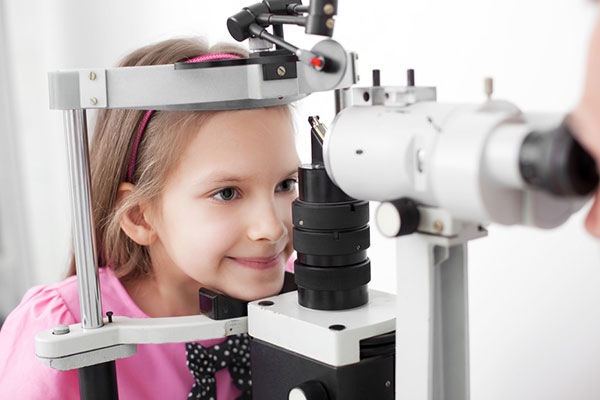Eye Exams for Children
WHEN SHOULD CHILDREN HAVE THEIR EYES EXAMINED?
According to the American Optometric Association (AOA), infants should have their first comprehensive eye exam after 6 months of age. They should then receive additional eye exams for children at 3 years of age, and just before they enter kindergarten or the first grade at about age 5 or 6.
A pediatric eye examination by includes:
- Evaluation of vision and ocular health
- Eye teaming (binocularity) skills
- Eye movement skills
- Focusing skills
- Evaluation for amblyopia (or “lazy eye”)
- Evaluation for strabismus (or eye turn)


WHEN SHOULD CHILDREN HAVE THEIR EYES EXAMINED?
According to the American Optometric Association (AOA), infants should have their first comprehensive eye exam after 6 months of age. They should then receive additional eye exams for children at 3 years of age, and just before they enter kindergarten or the first grade at about age 5 or 6.
- Evaluation of vision and ocular health
- Eye teaming (binocularity) skills
- Eye movement skills
- Focusing skills
- Evaluation for amblyopia (or “lazy eye”)
- Evaluation for strabismus (or eye turn)

WHEN SHOULD CHILDREN HAVE THEIR EYES EXAMINED?
According to the American Optometric Association (AOA), infants should have their first comprehensive eye exam after 6 months of age. They should then receive additional eye exams for children at 3 years of age, and just before they enter kindergarten or the first grade at about age 5 or 6.
- Evaluation of vision and ocular health
- Eye teaming (binocularity) skills
- Eye movement skills
- Focusing skills
- Evaluation for amblyopia (or “lazy eye”)
- Evaluation for strabismus (or eye turn)
Good eye health and vision is important to your child’s learning, and vision problems can affect their performance in school. Undetected or untreated vision problems can hinder a child’s ability to perform to their full potential in school. In fact, many eye diseases can impair vision or lead to vision loss, which is why it is important for people of all ages to have their eyes checked regularly.
At least 10 to 15 percent – or 8 to 12 million – children are at risk for vision impairment. Prevention of these conditions can be easy and can help your student perform his or her best at academics and sports, so schedule your child’s eye exam today! While you’re at it, schedule your own exam too!
